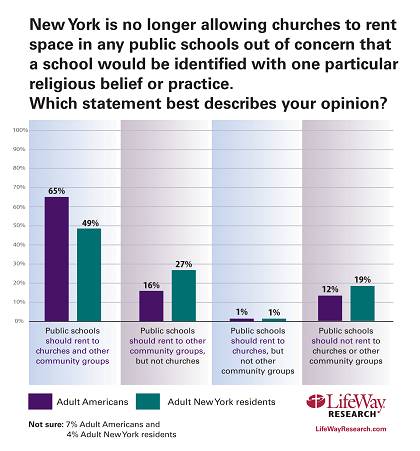FellowshipPreaching/TeachingLeadershipCelebrate RecoveryDiscipleshipSmall GroupsEvangelismWorshipMinistry
Banning Religion From the Public Square -- or at Least the Public School Building

A few weeks ago, I spoke to a church in New York City that is now vulnerable to eviction from the school building where they meet because they spoke of the wrong things -- religious things. As such, their speech is soon likely to be banned from NYC public school buildings that sit empty and unused on the weekend.
According to city officials, worship in a public facility -- when the schools are not even in session -- is too much mixing of church and state, so they've ordered dozens of churches evicted by Sunday, February 12.
I agree with most Americans who believe this is wrong-headed.
In a recent study by LifeWay Research, two-thirds of Americans believe public schools should rent to churches and other community groups. For that matter, school districts across the country have shown their agreement by renting to thousands of congregations every weekend.
Until recently, religious groups have been legally permitted equal access to public buildings in New York City. But recently the U.S. Supreme Court let stand the ruling of a lower court, which approved the New York City Department of Education's ban, opening up NYC churches to lawful eviction. So, legally the city government can enforce a ban, but just because it's legal doesn't mean it's best for our communities and our country.
CHURCHES BENEFIT COMMMUNITIES--Schools and churches make their communities better, and the public knows it. According to a 2011 Barna Research study:
"Three-quarters of U.S. adults believe the presence of a church is 'very' (53%) or 'somewhat' positive (25%) for their community. In contrast, only one out of every 20 Americans believes the influence of a church is negative."It seems odd for a municipality to ban something from public buildings that their constituents strongly view as positive. The New York City Law Department, however, disagrees, stating:
"We view this as a victory for the City's school children and their families. The Department was quite properly concerned about having any school in this diverse City identified with one particular religious belief or practice."Most Americans see churches as partners in the community, but the NYC school system sees churches as a threat rather than a benefit. They are mistaken. DISCRMINATING ON THE BASIS OF SPEECH CONTENT IS AGAINST OUR VALUES -- The NYC municipal government contends religious speech should be banned from public school buildings to avoid confusing our children. (Remember: Churches use the schools when school is not in session.) Yet, the Long Island public school I attended as a child had plenty of religions present -- and NYC today has nearly every faith represented. Allowing individuals to worship in empty public buildings does not confuse children about religion. To the contrary, it affirms our commitment to religious freedom. Father Richard John Neuhaus wrote against stripping religion from our institutions. Neuhaus believed religion is a public endeavor, not an enterprise best kept underground. I'm not one who believes in the war on religion by the secular elites, but it is hard not to see a problem with what Yale University scholar Stephen L. Carter called 'the culture of disbelief' in his book by the same name. The book, introduced to many by President Clinton, reminds us that banning public religion threatens the individual liberties of millions of Americans. RELIGION-NEUTRAL IS BETTER THAN RELIGION-HOSTILE--Any constitutional concerns about church use of public school buildings can be answered by a religion-neutral approach. A government that is religion-neutral will not discriminate based on the content of speech -- even unpopular religious speech. Thus, I stand with my Muslim friends who wish to rent on Friday, my Jewish friends on Saturday, and my Christian friends on Sunday -- all paying money to use space that belongs to us all. The rationale that leads to a ban like the one enacted by New York City follows the principle that in order to avoid poisoning young minds, we must strip religion out of our lives, and essentially relegate it like pornography to the back of the store. Yet metro NYC includes a robust mixture of the cultural and religious milieu. Renting empty public buildings, with the income going to under-resourced schools, benefits many and imposes nothing. We need to decide if religion is a danger to our culture that should be banned from the public square, or something to be valued and protected. I desperately pray it is the latter.
--- --- --- ---
This article comes from Baptist Press. Copyright (c) 2012 Southern Baptist Convention, Baptist Press. Used by permission. Get Baptist Press headlines and breaking news on Twitter (@BaptistPress), Facebook (Facebook.com/BaptistPress) and in your email (baptistpress.com/SubscribeBP.asp).






